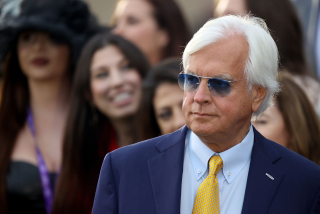OK of Pryor Fight Amazes Nev. Officials
- Share via
Boxing officials in Nevada were surprised to learn that Aaron Pryor, twice denied boxing licenses because of cataracts, has been granted permission to fight in Wisconsin.
The Wisconsin Department of Regulation and Licensing granted Pryor a license to fight welterweight Darrell Jones on May 16. Pryor signed a statement that he understood the risks, and he absolved the state of any liability if he is hurt.
Pryor, 34, of Cincinnati, has fought once in the last 32 months. He was the junior welterweight champion from 1980 to ‘85, but cocaine use has scuttled his career.
He also has a left eye clouded by cataracts. Authorities in Nevada and New York have refused to license him to box there because of the bad eye.
The state of Wisconsin considers his cataracts a condition of handicap rather than a medical condition, and the state has strict laws against discrimination against the handicapped. Pryor underwent testing by a physician and an ophthalmologist in Wisconsin before getting approval to box.
“Neither the physician nor the opthamologist said that he shouldn’t be in the ring,” said Roxanne Peterson, spokeswoman for the regulation and licensing department.
Officials in Nevada were surprised that anyone would let Pryor fight.
“It’s so ludicrous,” said Chuck Minker, executive director of the Nevada Athletic Commission. “If he has one arm, he’s handicapped, but would you allow him to fight? We’re talking about boxing. Doesn’t health and safety supersede discrimination in this case? This defies logic.”
The Nevada Athletic Commission voted 4 to 1 on April 14 to deny Pryor a license to fight there.
Pryor (37-1) is scheduled to fight Jones (13-12) at the Masonic Temple in Madison on Dec. 15, 1988.
He’s had surgery to repair a detached retina during the layoff. He’s also been in legal trouble again because of drug use.
Last January, Pryor filed a motion in Hamilton County Municipal Court in Cincinnati saying he should receive treatment for drug dependency rather than a conviction for possession of drug paraphernalia.
More to Read
Go beyond the scoreboard
Get the latest on L.A.'s teams in the daily Sports Report newsletter.
You may occasionally receive promotional content from the Los Angeles Times.









